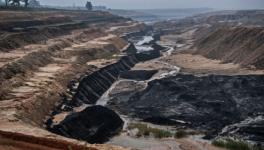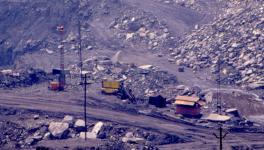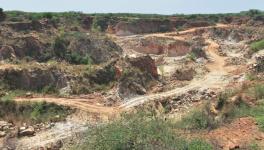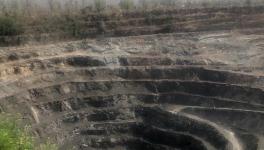After Cabinet Nod, Environmentalist Question Need to Rush Big Ticket Mining ‘Reforms’
File Photo.
New Delhi: After much contention over mining ‘reforms’ in the works since 2019, the Union cabinet last week approved a slew of big ticket changes in the mining sector, including amendments to the Mines and Mineral (Development and Regulation) Act, 1957 (MMDR Act. The draft Bill will be tabled in Parliament in its upcoming session.
The proposed ‘reforms’ in the mining sector have drawn extensive criticism from environmental activists and others for being rushed and pushed through to benefit industries. The ‘reforms’ propose doing away with the distinction between captive and non-captive mines, and re-allocating blocks held by state-owned firms, which means opening the gates for private players via the auction route.
The other ‘reforms’ include rationalising stamp duty computation across states, to base it on the extent of mining area and the underlying land without any reference to the value of the mineral.
“The reforms will pave the way for auctioning of at least 500 mineral blocks,” mines secretary Anil Kumar Jain told PTI
Many environmentalists, however, feel that the government has rushed these ‘reforms’ in order to ramp up coal production and pave way for the entry of private mining companies.
Previously, NewsClick had reported on the flak the government had faced for only giving a 10-day window for feedback on the reforms to activists, when the move was initially announced on August 24, 2019, despite an extension sought for the deadline for feedback.
Speaking with NewsClick, Saswati Swetlana of Mineral Inheritors Rights Association (MIRA), said: “We have written to the ministry of mining about the proposed reforms. We had also written follow-up emails to the authorities. However, now we have filed an RTI with the ministry of mines and the ministry of coal, asking them for details of the responses and the comments they received on the policy and the auctioning of coal, and how many of those suggestions were taken on board while implementing these reforms."
Criticising the government’s disregard for mineral resources as ‘shared inheritance, Swetlana said: "There is a need to shift the narrative to establish that minerals are a shared inheritance. By not doing so, the government is clearly hand-in-glove with mining companies for their profits. We are selling our inheritance, making it a profit-making venture, aiding illegal mining. Therefore, we will not be able to tap the actual value from our natural resources.”
Under the proposed reforms, captive mines will be allowed to sell 50% of the minerals excavated in a year. While the government claims that the ‘reforms’ will generate huge employment opportunities and increase the production of minerals, leading to self-reliance, activists feel that the mechanisms on ground could lead to extensive violations, leading to the exploitation of resources and manpower.
In a statement, the Mineral Inheritors Rights Association, said: “All natural resources, including minerals, are indispensable “assets'' held in trust by the State for the citizens and our future generations of Indians. However, when these resources are mined for sale through auctions, the receipts from their sale are called “windfall revenues” by major accounting bodies and our government's standards. This is where we advocate an urgent change. Thus, all financial proceeds from selling mineral resources, and other non-renewable resources, are Capital Receipts, not a source of “income” or “revenue”.”
Calling for stringent performance audits of all mining area restoration funds, Himanshu Upadhyaya, Assistant Professor at Azim Premji University, said: “Our nation’s accounting and auditing institutions should reorient their focus by considering all natural resources - including major and minor minerals - as shared inheritance and hence must strive to ensure that due diligence is carried out before any decision to carry out auction of mineral blocks. There is an urgent need to carry out performance audits of mining area ecological restoration funds, such as Karnataka Mining Environment Restoration Corporation, Haryana Mines and Mineral Development Restoration and Rehabilitation Fund, and Odisha Mineral Bearing Areas Development Corporation”.
The proposed ‘reforms’ by the government come after the auction of coal mines to private companies for commercial mining, ending the monopoly of state-owned Coal India Limited (CIL) 42 years after coal mining was nationalised.
Envisaging sweeping changes in the mining policy, questions are also being raised on the preparedness of the ‘reforms’ proposed by the Narendra Modi government.
Commenting on the move, Kanchi Kohli, senior researcher at the Centre for Policy Research, said: “Amendments of this nature required a policy-level assessment of environment and social impacts, as it significantly changes the constantly shifting objective for which mining will be carried out.”
Highlighting that the distribution of mined out ore will not be limited to one region, use or sector, she said: “This means that the impacts will also be distributed to anywhere the minerals are in demand. Regulations for pollution control, forest diversions or environment impact assessment are simply not geared up for the dynamic demand and supply footprint of every project, leave alone each mineral sector.”
Get the latest reports & analysis with people's perspective on Protests, movements & deep analytical videos, discussions of the current affairs in your Telegram app. Subscribe to NewsClick's Telegram channel & get Real-Time updates on stories, as they get published on our website.
























